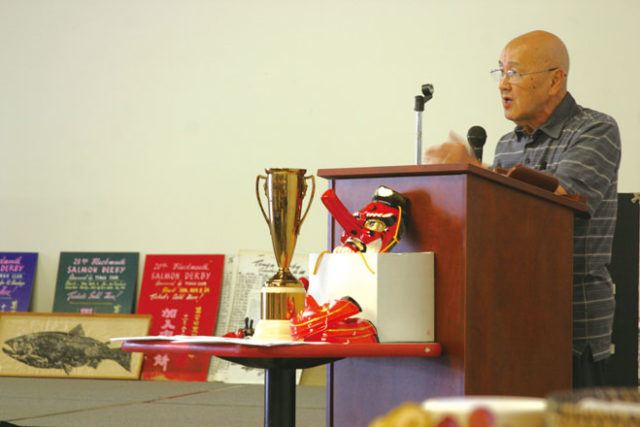
By Shihou Sasaki
The North American Post
It may just be a fishing club but their legacy is much more than catching big salmon.
Having over 70 years of history, the Tengu Club, a fishing group running a salmon derby, is now commemorated into a book: “Tengu – Tales Told by Fishermen & Women of The Tengu Club of Seattle.”
Author Mas Tahara held a book event last Saturday at the Nagomi Tea House joined by about 70 attendees of the club members and their families.
The annual fishing event has been the longest-running salmon derby organized by the local fishing club. Hundreds joined as dozens of salmon were weighed at the derby one year, a seasonal tradition for the community run beside a matsutake hunt in the mountains.
“I am convinced that the recreational salmon fishing in the lives of the Japanese Americans in our community has no comparison in all of the other sport activities they have ever engaged in, in term of popularity and longevity,” Tahara says in the book.
The original Tengu Club was established in 1937, hosting the derby in the winter when plenty of rental boats were available for the Japanese populace, who were unable to join the regular competitions freely.
Eileen Yamada Lamphere had photos of her grandfather Carl Osawa winning a trophy – the greatest number of salmon caught in 1925. The award was presented by K. Asaba Fishing Tackle Store, one of eight tackle stores that organized the Japanese Fishing Tackle Dealers Association.
The book reads that some of the members recalled the derby even taking place on Sunday, Dec. 7, 1941, when Japan attacked the Pearl Harbor.
After facing a several-year intermission due to the mass-exclusion from the area during World War II, the Nikkei fishermen group was strongly encouraged to restart the derby in 1946 – not once, but twice in the same year.
The situation has changed year by year. Due to the shortage of blackmouth salmon in the Puget Sound, the derby was suspended last year. The Tengu members will hopefully open the derby this year since recent reports were better than last year.
Dozens of members gather every chilly Sunday morning from October to December at Seacrest Boathouse in West Seattle. Not only do they like to fish but they also gather to share their proud catches and family stories. These times have been great opportunities to learn about the history of the Nikkei community, said Ron Mamiya, a grandson of Kinzo Asaba who ran the Asaba Fishing Tackle.
“A lot of history that I learned about the Japanese community actually came from Tengu,” Mamiya said. “We have a great history of people coming together…”
The club has kept its traditional rule with the mooching technique, one of two ways to fish salmon. The term came from “the envisions other fishermen asking or begging the Japanese the herring and other setups that were so successful in catching fish in the olden days,” the book reads.
The book also added that the popular recreational squid jigging in Elliot Bay originated from the Tengu Club members around 1973.
Mamiya also said that the strong partnerships and community ties certainly resulted in building such a legacy.
The book event exhibited the derby trophy, record books and videos, which were also shared at the derby. All derby records were written by hand in notes dating from 1946. The hundreds of names in the books are the essence of the history of the community: parents or grandparents of the local Nikkei, who enjoyed the days fishing and their pound catch of big salmon.
Tahara, who has been with the club for 50 years and won the 1995 and 2006 derby, said that there was so much information in the 70-year history but he tried his best to put it into one book. The Japanese Community Service in Seattle became the publisher of the project and copies were handed out to the Tengu Club members, families and key community organizations.
He added that the items will hopefully be shared at some museums including the Japanese Cultural and Community Center of Washington.



